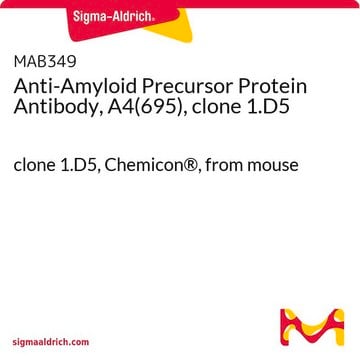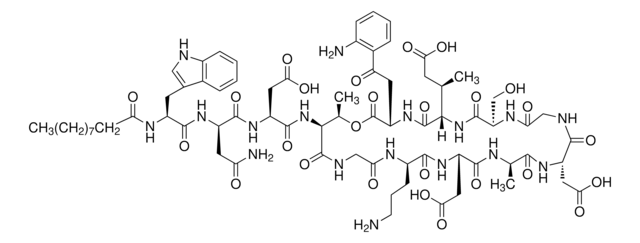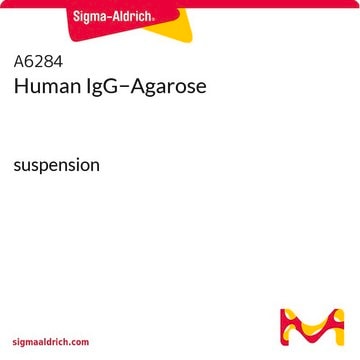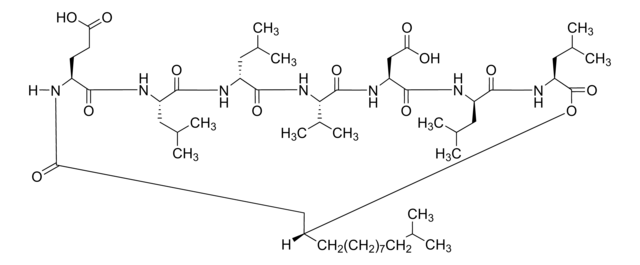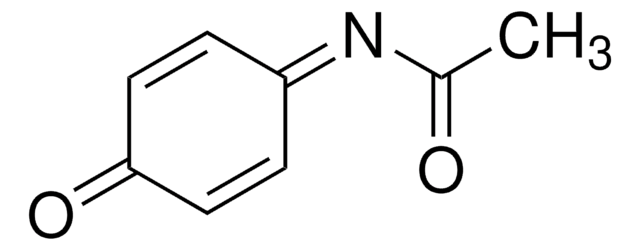S5269
Serum amyloid P component human
buffered aqueous solution
Synonim(y):
Amyloid P component from serum
Zaloguj sięWyświetlanie cen organizacyjnych i kontraktowych
About This Item
Polecane produkty
Postać
buffered aqueous solution
Poziom jakości
numer dostępu UniProt
Warunki transportu
wet ice
temp. przechowywania
2-8°C
informacje o genach
human ... APCS(325)
Szukasz podobnych produktów? Odwiedź Przewodnik dotyczący porównywania produktów
Zastosowanie
Human serum amyloid P component has been used as a standard in a study to characterize it as a plasma marker for Parkinson′s disease by a proteomic approach.
Działania biochem./fizjol.
Serum amyloid P component (SAP) is named for its universal presence in amyloid deposits (senile plaque and neurofibrillary tangles) in Alzheimer patients although it is exclusively synthesized in the periphery. SAP levels in CSF can be useful for assessing cognitive impairment in AD patients. However, SAP appeared not to be required for A beta deposition since no endogenous SAP immunoreactivity was detectable in transgenic mouse overexpressing beta-protein precursor. SAP belongs to the pentraxins family of oligomeric serum proteins which is highly conserved through evolution. Its presence has been found in Limulus polyphemus haemolymph. A recent report demonstrated that, in the presence of calcium, SAP can bind to free DNA and chromatin released through apoptosis or necrosis, displacing histone H1 and causing its solubilization and degradation. SAP knock out mice developed antinuclear autoimmunity and glomerulonephritis. However, the protective role of SAP in human SLE is still controversial. In addition, SAP neutralizes LPS and is potentially useful in defense against serious gram-negative sepsis in humans.
Postać fizyczna
Solution in 0.01 M Tris, 0.14 M NaCl at pH 8.0 containing 0.01 M EDTA and 0.1% (w/v) NaN3
Oświadczenie o zrzeczeniu się odpowiedzialności
RESEARCH USE ONLY. This product is regulated in France when intended to be used for scientific purposes, including for import and export activities (Article L 1211-1 paragraph 2 of the Public Health Code). The purchaser (i.e. enduser) is required to obtain an import authorization from the France Ministry of Research referred in the Article L1245-5-1 II. of Public Health Code. By ordering this product, you are confirming that you have obtained the proper import authorization.
This page may contain text that has been machine translated.
Kod klasy składowania
10 - Combustible liquids
Klasa zagrożenia wodnego (WGK)
WGK 1
Temperatura zapłonu (°F)
Not applicable
Temperatura zapłonu (°C)
Not applicable
Certyfikaty analizy (CoA)
Poszukaj Certyfikaty analizy (CoA), wpisując numer partii/serii produktów. Numery serii i partii można znaleźć na etykiecie produktu po słowach „seria” lub „partia”.
Masz już ten produkt?
Dokumenty związane z niedawno zakupionymi produktami zostały zamieszczone w Bibliotece dokumentów.
Amyloid P component as a plasma marker for Parkinson's disease identified by a proteomic approach
Han-Min Chen
Clinical Biochemistry (2011)
New insights into the role of serum amyloid P component, a novel lipopolysaccharide-binding protein.
C J de Haas
FEMS immunology and medical microbiology, 26(3-4), 197-202 (1999-11-27)
Serum amyloid P component (SAP) is a highly preserved plasma protein named for its ubiquitous presence in amyloid deposits. Although SAP is described to bind many ligands, no clear biological function has been ascribed to it as yet. This review
C J de Haas et al.
Infection and immunity, 67(6), 2790-2796 (1999-05-25)
Lipopolysaccharide (LPS) is the major mediator of gram-negative septic shock. Molecules that bind LPS and neutralize its toxic effects could have important clinical applications. We showed that serum amyloid P component (SAP) neutralizes LPS. A SAP-derived peptide, consisting of amino
M Kimura et al.
Neuroscience letters, 273(2), 137-139 (1999-10-03)
Serum amyloid P component (SAP) is a normal plasma constituent that is observed both in senile plaque and in neurofibrillary tangle in brains of patients with Alzheimer's disease (AD). In this study, we evaluated the SAP levels in cerebrospinal fluid
M C Bickerstaff et al.
Nature medicine, 5(6), 694-697 (1999-06-17)
Serum amyloid P component (SAP), a highly conserved plasma protein named for its universal presence in amyloid deposits, is the single normal circulating protein that shows specific calcium-dependent binding to DNA and chromatin in physiological conditions. The avid binding of
Nasz zespół naukowców ma doświadczenie we wszystkich obszarach badań, w tym w naukach przyrodniczych, materiałoznawstwie, syntezie chemicznej, chromatografii, analityce i wielu innych dziedzinach.
Skontaktuj się z zespołem ds. pomocy technicznej